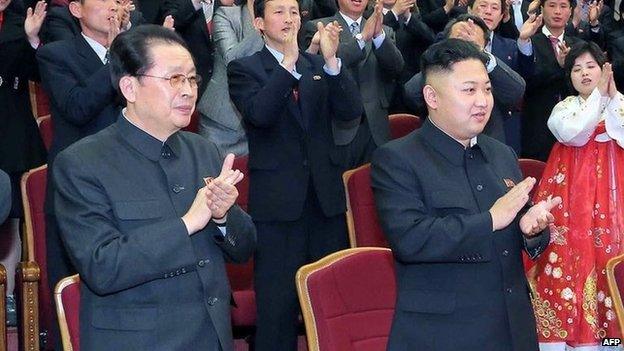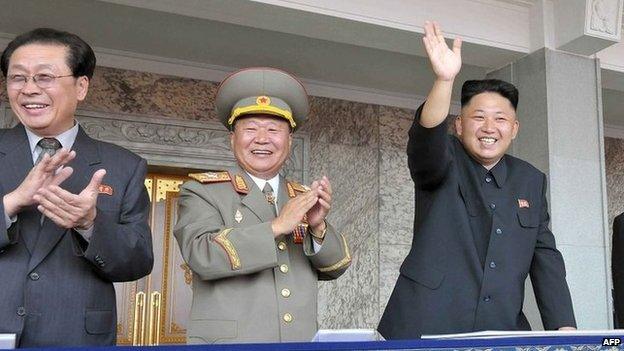North Korea purge: Brutal but risky move
- Published

North Korean media have described Mr Chang, left, as "despicable scum" and "a traitor for all ages"
The official North Korean announcement of the execution on 12 December of Chang Song-thaek, the North's second most prominent official and uncle of the country's leader, Kim Jong-un, is a brutal but potentially politically risky move by Mr Kim to assert his political primacy and a shift towards an increasingly centralised and personalised system of rule.
Mr Chang's swift and bloody elimination (unconfirmed reports talk of him having been executed by machine-gun), some four days after he was shown on state television being dragged out of a meeting of the politburo, is relatively rare in a country where the leadership, notwithstanding its past authoritarian crackdowns, has tended to remove political opponents with limited fanfare. Today's announcement appears to be a throwback to the 1950s, when such uncompromising personal purges were more commonplace.
Equally unusual has been the lengthy catalogue of crimes that Mr Chang was convicted of, including economic corruption, financial mismanagement, pursuing a "decadent, capitalist lifestyle", overseas gambling, disobeying the country's military, and most seriously of all, planning a coup and seeking to seize "the supreme power of [the]… party and state".
In uncompromisingly vituperative language, the North's media describes Chang as "despicable scum", "a traitor for all ages" and of mobilising "anti-party, counter-revolutionary factional elements" intent on overthrowing the country's leadership.
The reference to a group of regime opponents including "reactionaries" and "undesirable and alien elements", and not merely a single disloyal individual, exposes ambiguities about Kim Jong-un's actual authority.
It may hint at a wider circle of individuals hostile to the regime, and the next few days and weeks will be an important indication of how widespread such opposition could be, especially if the purge is widened to include other individuals formerly close to Mr Chang.
Removing a single individual may not be enough to quell dissent if it is widespread; alternatively a swift and brutal execution may be a sufficiently powerful deterrent to any other would-be rivals.
Diluting family credentials
By emphasising and publicising to the North Korean public Mr Chang's longstanding disloyalty not only to Kim Jong-un, but also to the country's two previous leaders Kim Jong-il and Kim Il-sung, the leadership has taken a risk.
Exposing disunity so dramatically challenges the state's narrative of political cohesion and strength at home and may, inadvertently, raise doubts in the minds of ordinary North Koreans about the stability of the new leadership, in power for barely two years.
Executing a close member of the Kim dynasty, albeit one linked by marriage rather than by blood ties (Mr Chang's wife is Kim Kyong-hui, the sister of Kim Jong-il), is also an unusual step, since it potentially dilutes the familial credentials that underpin the legitimacy of the North's family state structure.
Kim Kyong-hui has herself not been seen in public for some time, perhaps on account of her poor health, and there has been speculation that she may have had a hand in the removal of her husband, prompted by unconfirmed reports of his womanising and a long period of separation.
Economic policy disagreements may also have had a role to play in Mr Chang's removal. Mr Chang has been seen as a reformer in some circles and a leading official with close ties to the Chinese government.
The North Korean media denunciation of Mr Chang includes a criticism of his management of a number of critical economic zones in the north of the country, and the regime may be seeking to insulate itself from any failures by scapegoating Mr Chang for the government's more systemic economic shortcomings.
Reports of defections

Kim Jong-un, right, has been in power for nearly two years following the death of Kim Jong-il
However, economic reform itself is unlikely to be retarded, despite Mr Chang's removal.
The government remains committed to the opening of some 14 special economic zones, underpinned by new legislation passed this year; China and North Korea have this week confirmed their intention to develop a new transnational rail connection linking Beijing and Pyongyang and possibly extending as far south as the border with South Korea; and next week, North-South talks will take place in the Kaesong Industrial Zone, bringing together international business representatives from a number of G20 countries, as well as officials from the International Monetary Fund and the Asian Development Bank.
In the next few days, the North's neighbours will be closely watching for signs of further instability. There have been unconfirmed reports of defections overseas by some of Mr Chang's associates and the recalling to Pyongyang of Mr Chang's family members, perhaps as a preliminary to further disciplinary measures.
Domestic upheaval may also have foreign policy consequences, as the government seeks to shore up its military defences to guard against any attempt by outside powers to exploit the instability at home.
The South Korean military is closely monitoring the North's forces and there are some reports, as yet unconfirmed, of tighter border controls by the North and the reinforcing of the North's military assets along the Northern Limit Line (NLL) in the often contested waters off the west of the peninsula.
North Korean military adventurism, whether in the form of a missile launch, a border clash at land or sea with the South, or a fourth nuclear test, might be an attractive, but high-risk option for Pyongyang as a means of distracting opinion at home and creating unity via a deliberately staged crisis abroad.
This, and the possibility of further political instability within the North, are powerful incentives for the United States and its regional allies to monitor developments in the North closely over the next few days.
While the evidence suggests that Kim Jong-un's position has been strengthened rather than weakened by the events of the last week, the novelty and dramatic nature of these changes suggest that the political situation, for now, will remain fluid and difficult to predict.
Dr John Swenson-Wright is a senior lecturer at the Faculty of Asian and Middle Eastern Studies, University of Cambridge, and Senior Consulting Fellow, Asia Programme, Chatham House.
-
Kim Jong-il (d)
×
Kim Jong-il was one of the most secretive leaders in the world.Tales from dissidents and past aides created an image of an irrational, power-hungry man who allowed his people to starve while he enjoyed dancing girls and cognac.
But a different picture was painted by Sung Hae-rim, the sister of one of his former partners in her memoir, The Wisteria House.
She describes a devoted father and a sensitive, charismatic individual, although she admits even those closest to him were fearful of him.
North Korean media depicted him as a national hero, whose birth to the country's founder, Kim Il-sung, was marked by a double rainbow and a bright star.
-
Kim Kyung-hee
×
The youngest sister of the late Kim Jong-il and the wife of the man formerly regarded as the second most powerful figure in North Korea, Chang Song-thaek.
She has held a wide range of important Workers' Party positions including being a member of the all-powerful Central Committee.
Her promotion to four-star general made Kim Kyung-hee the first North Korean woman ever to achieve such status.
Analysts say Kim Kyung-hee and her husband were seen as mentors for the new leader Kim Jong-un when he came to power in 2011. But news of her husband's execution in December 2013 suggests the most significant upheaval in North Korea's leadership since Mr Kim succeeded his father.
-
Chang Song-thaek (d)
×
Chang Song-thaek was married to Kim Kyung-hee, the younger sister of the late Kim Jong-il. When the inexperienced Kim Jong-un became the new leader in 2011, the couple were widely thought to be acting as his mentors.
In December 2013, the powerful uncle - who sat on the country's top military body - was denounced by the state-run news agency for corruption. Images were shown of him being removed from a Politburo meeting by uniformed guards. He was then executed.
Mr Chang's execution is the biggest upheaval in North Korea's leadership since Mr Kim succeeded his father.
-
Kim Jong-nam
×
Kim Jong-nam, 39, is Kim Jong-il's eldest son.
Sung Hae-rang, the sister of Kim Jong-nam's deceased mother Sung Hae-rim, has written in her memoir that Kim Jong-il was extremely fond of Kim Jong-nam and was pained to be away from him. Like his half-brothers, Kim Jong-nam studied at an international school in Switzerland.
His chances of succession appeared to be ruined when, in 2001, Japanese officials caught him trying to sneak into Japan using a false passport. He told officials that he was planning to visit Tokyo Disneyland.
Some analysts argued that he may have been forgiven by his father, as there is precedent for the regime reinstating disgraced figures after a period of atonement. Confucian tradition also favours the oldest son.
But in a rare interview while on a trip to China last year, Kim Jong-nam said he had "no interest" in succeeding his father.
-
Kim Sul-song
×Kim Sul-song, 36, is Kim Jong-il's daughter born to his first wife, Kim Young-sook.
Reports say she has worked in the country's propaganda department, with responsibility for literary affairs.
One South Korean report said she had also served as her father's secretary.
-
Kim Jong-chul
×
Kim Jong-chul, 29, studied at an international school in Switzerland. He works in the WKP propaganda department.
His mother, Ko Yong-hui, is said to have been the North Korean leader's favourite consort.
However, Kenji Fujimoto, the pseudonym of a Japanese sushi chef who spent 13 years cooking for Kim Jong-il, has written that the leader considered his second son "no good because he is like a little girl".
-
Kim Jong-un
×
Kim Jong-un, the second son of Kim Jong-il and his late wife Ko Yong-hui, was anointed "the great successor" by Pyongyang.
Like his older brothers, he is thought to have been educated abroad.
A Japanese sushi chef who worked for Kim Jong-il for 13 years up to 2001 said that he "resembled his father in every way, including his physical frame".
Speculation that he was being groomed to succeed his father had been rife for years.
Since taking power, he has presided over a long-range missile test, North Korea's third nuclear test and most recently the execution of his uncle, Chang Song-thaek.
-
Ri Sol-ju
×
Ri Sol-ju was introduced as Kim Jong-un's wife in state media reports about the opening of an amusement park in July 2012.
Reports simply said he attended the event with his wife, "Comrade Ri Sol-ju".
Little more is known about Ri Sol-Ju, although there has been much speculation about her background since pictures first emerged of Kim Jong-un with an unidentified woman. There is a North Korean singer of the same name, but she is not now thought to be the same person.
State media did not mention when the couple got married.
-
Kim Han-sol
×
The grandson of Kim Jong-il and nephew of leader Kim Jong-un has said he wants to "make things better" for the people of his country.
Kim Han-sol, 17, spoke of his dreams of reunification of the two Koreas in an television interview in Bosnia, where he is studying. Kim Han-sol said he had never met his grandfather or uncle.
He described an isolated childhood spent mostly in Macau and China, after his birth in Pyongyang in 1995. In the future, he said he pictured himself going to university and then ''volunteering somewhere''.
